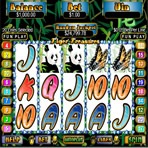Gaming in the Golden City
Gaming establishments were increasingly geared to accommodate not everyman, but rather specific groups of bettors, after the early 1851.
Local elites which had always been able to afford to play in less public places grew larger and began to gamble more exclusively among themselves.
Like the upper classes of any city, they naturally preferred to play against each other in surroundings that catered to their monied tastes, rather than facing the prospect of losing to citizens of lesser stature.
Meanwhile, the lower strata of society increasingly played games that seemed less than reputable in saloons distant from the city center.
These dives, which tended to flourish along the waterfront and on the Barbary Coast, were devoted less specifically to gambling than earlier midtown gaming halls.
Yet, through them and through the luxurious clubs that appealed to local elites, San Franciscans continued to gamble abundantly.
A hierarchy of clubs and dens accommodated the social divisions that grew more steadily prominent in the city. Consequently, the amount of betting appeared to decrease.
People now gambled in less public and less heterogeneous groups located at a greater distance from the city center. Betting was not as visible as before.
Moreover, Californians embraced different games that confronted more to the modified settings. Faro, Monte, and roulette still thrived at special occasions like state fairs as openly played as in the palmy days of 1849 and 1850.
But those speedy games had already begun to give way to an ever more popular California pastime. Poker flourished during the last half of the nineteenth century on the West Coast, partly because it remained legal so long as games were not operated by professional dealers.
Some proprietors tried to cut themselves in for a percentage of the stakes, but the game was mostly played as a private diversion and that suited both the upper and the lower class bettors who played at the more exclusive sites.
Poker became king among sporting men in California. The betting contest was slower and less commercial than faro, Monte, and roulette, but it was an American favorite appropriate for a more settled population.
Californians' conversion to poker signaled that their former society had begun to recede. Out of the grasping and daring days of the Gold Rush had come the indigenous western gambling that mirrored the speculation and sharp practice of the population.
Once Californians determined to leave the frontier behind them, they set about replacing their original forms of gaming with styles more suited to a people intent on garnering eastern approval.
The kind of play that had flourished from 1849 to 1856, a practice marked by professional dealers, public settings, and fast-paced games, gradually disappeared in California, but it did not die out altogether.



